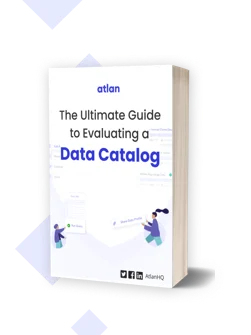Business Glossary: The Key to Data Discovery and Governance

Share this article
What Is a Business Glossary?
Permalink to “What Is a Business Glossary?”A business glossary is a centralized knowledge bank that lists all of the key business terms and concepts used in the day-to-day operation of an organization. It also provide additional information around an asset like context and ownership.
A business glossary also promotes data visibility and drives collaboration among team members by unifying knowledge. In short, a business glossary standardizes an organization’s parlance so everyone speaks and understands the same common language.
An example of a business glossary is the Financial Industry Business Ontology (FIBO), which gives definitions to terms used in the business of finance.
FIBO is an open community-sourced project intended to “develop, maintain, and promote global platform-independent, machine-readable and unambiguous data standard that enables understanding of the financial terminology, cross-system federation and aggregation of data to improve the effectiveness of decisions, to improve efficiency in regulatory reporting and to fast-track the adoption of advanced analytical capabilities for financial services.”
A business glossary helps employees communicate effectively and stay aligned as they work toward reaching company goals. When an organization grows to hundreds or even thousands of employees, it becomes increasingly challenging for everyone to speak and comprehend the same business language.
For instance, the marketing team might use an acronym like CPC (cost per click) that is unfamiliar to the product team, leading to confusion, inefficiencies, and reduced productivity in the process of data discovery. A business glossary helps remedy this challenge.
What’s inside a business glossary?
Permalink to “What’s inside a business glossary?”While each business glossary is unique to the organization, most glossaries include:
- Terms and definitions
- Data categorization
- Metadata
Terms and definitions are the equivalents of a company dictionary. It contains standardized terms used across the business and their agreed-upon definitions.
Data categorization identifies common qualities among data points and groups them so users can query, discover, and identify relationships between the data.
Metadata provides active or static information about data (date created, type, location), providing context to data assets so they can be better understood and more useful in discovering insights.
Why is a business glossary important?
Permalink to “Why is a business glossary important?”A business glossary is important because a lack of alignment on business terms and their definitions can lead to misunderstandings, inefficiencies, and reduced productivity. Some of the benefits of a business glossary include:
- improved communication, keeping team members aligned
- enriched training, increasing worker productivity
- better stewardship, fostering trust in data assets
Let’s explore these benefits in more depth.
Improved communication, keeping team members aligned
Permalink to “Improved communication, keeping team members aligned”Because a business glossary standardizes terms and concepts, it facilitates smoother, more constructive discussions between team members. For example, the term “sales quota” can have multiple definitions. Does a sales quota consist of just net new customers or are current customer upsells included in the scope? What timeframe does a sales quota cover?
It’s entirely possible for your marketing, sales, and finance teams to have differing definitions for “sales quota” resulting in differing data analysis and insights. They each might determine they have failed, met, and exceeded “sales quota” goals using the exact same metrics, leading to confusion and the need to run the numbers again, wasting time and resources. But a business glossary cuts through the confusion by providing a company-wide definition so that team members can operate in better alignment.
Business glossaries are also particularly useful in helping data workers communicate with the rest of the organization. Data workers use them to put the results of complex data analysis into a language that business users understand.
Enriched training, increasing worker productivity
Permalink to “Enriched training, increasing worker productivity”Getting new team members up to speed is always challenging, but including a business glossary within employee training programs makes onboarding much easier. When new employees have a reference source for unfamiliar terms they hear in meetings or discussions, they depend less on senior leadership and contribute to the team much quicker.
Better stewardship, fostering trust in data assets
Permalink to “Better stewardship, fostering trust in data assets”A business glossary is a living document that should be updated by a governance committee or office as a business grows. Governance of the business glossary should include several components:
- Formal approval process for new terms, categorizations, and metadata
- Workflow for identifying and mitigating errors
- Establishment and transparency of the responsibilities each member of the committee holds in the process
- Plan for rolling updates out to the company
Taking these steps will engender greater trust within an organization, allowing team members to leverage the business glossary with confidence.
The role of a business glossary in data discovery
Permalink to “The role of a business glossary in data discovery”A business glossary is central to a data catalog and vital to data discovery. With the help of metadata, a business glossary assigns context to data, allowing users to find what they’re looking for and leverage it faster. It also documents relationships between terms, defines acronyms, and maps data so users can not only find it, but also understand it.
For example, a recently-hired finance analyst might be viewing dashboards containing last month’s financial performance and see a column labeled ‘business unit.’ They might wonder if that is a department or a business unit within another department. With a business glossary, they can easily look up this term to understand its meaning and apply it to their analysis.
Business glossary and its role in data governance
Permalink to “Business glossary and its role in data governance”Data governance is beyond rules, policies, and processes. At its heart governance helps teams to work together around data and thereby maximizing the ROI of your data assets.
A business glossary is a key pillar in the modern data governance stack:
- A glossary in part helps set standards for data quality — accuracy, consistency, and credibility.
- A business glossary also helps improve confidence and trust in business decision-making.
For example, imagine an organization that collected data on customer purchasing habits without a data catalog and its business glossary. While some lead team members might understand the data and how it applies to the business, individuals with less training might not. They could come to inaccurate conclusions that contradict those of the leadership, or they could simply bypass the data altogether and miss important insights that could enable the company to better position their products. Plus, there would be limited visibility into who is actually in control of the data and how it’s used, all hallmarks of poor data governance.
Business Glossary: Best practices
Permalink to “Business Glossary: Best practices”Here are a few best practices you can follow to develop your business glossary.
- Structure first, execution second
You’ll want to lay the foundation of the business glossary before building it. This is accomplished by determining what and who: What will go into the business glossary and who will be responsible for putting it there? Making this your first step ensures the orderly development of a business glossary that is intuitive for users to navigate.
- Treat the glossary as a product
It can be easy for organizations to cut corners when it comes to internal projects because they don’t directly contribute to revenue. But for a business glossary to truly succeed, it should be designed and treated with the same high regard and attention to detail as your business would its own product or service. This will not only improve the quality of the final output, but also increase its organizational adoption.
- Choose your implementation approach
It’s easy for the development and maintenance of a business glossary to become neglected during the day-to-day operation of a business. This isn’t good for a living document that needs to scale with an organization for it to be maximally effective. Right from the start, determine how you’ll implement the creation and upkeep of the business glossary so that it evolves in a predictable fashion.
Business glossary: Simple but effective tool
Permalink to “Business glossary: Simple but effective tool”A business glossary is a simple yet effective tool in helping organizations operate more efficiently. When team members all speak the same business language, they can work toward achieving milestones with less confusion and misunderstanding.
If you evaluating a business glossary tool for your team, do take Atlan for a spin - Atlan is more than a business glossary solution, it is a truly modern data catalog built on the premise of embedded collaboration that is key in today’s modern workplace, borrowing principles from GitHub, Figma, Slack, Notion, Superhuman, and other modern tools that are commonplace today.
Business glossary: Related reads
Permalink to “Business glossary: Related reads”- Business glossary vs. Data catalog: The definitions, differences, and examples
- What is a data glossary? And four ways to create a useful one
- What is a business data glossary template & how to create one for your organization
- What is a data dictionary: Purpose, importance, and why do you need one?
- Data Catalog: Does Your Business Really Need One?
Share this article



















